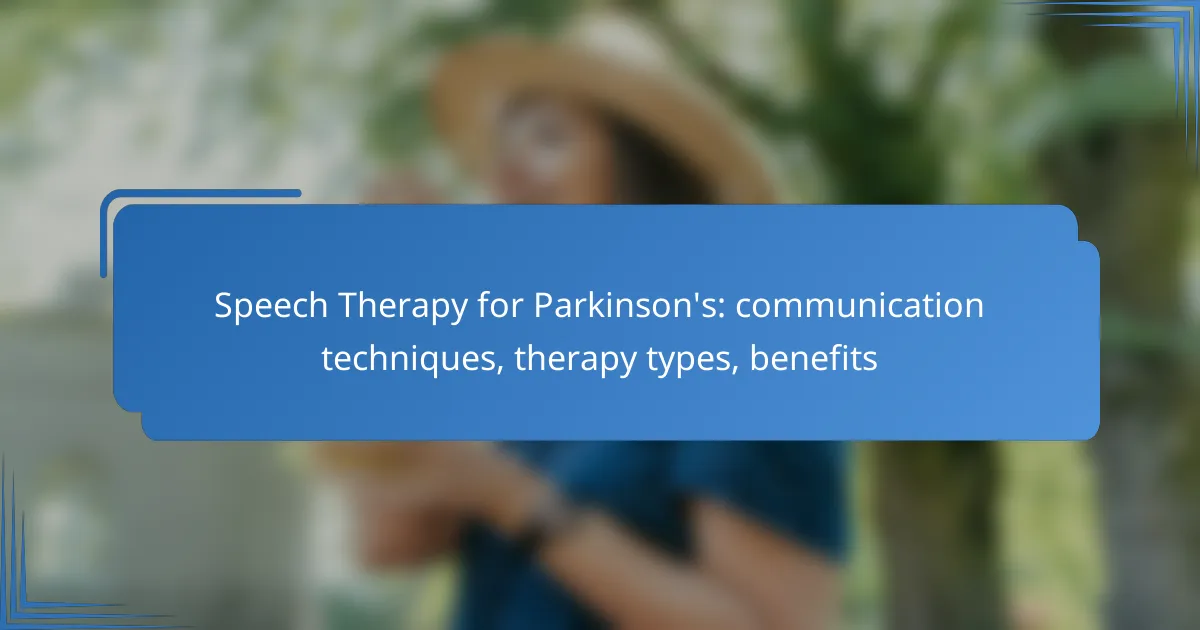Speech therapy plays a crucial role in enhancing communication for individuals with Parkinson’s disease, utilizing tailored techniques to address specific speech-related challenges. By incorporating articulation exercises, breathing techniques, and various therapy formats, patients can significantly improve their clarity, confidence, and overall quality of life. These methods not only foster better communication but also encourage greater social engagement and personal expression.
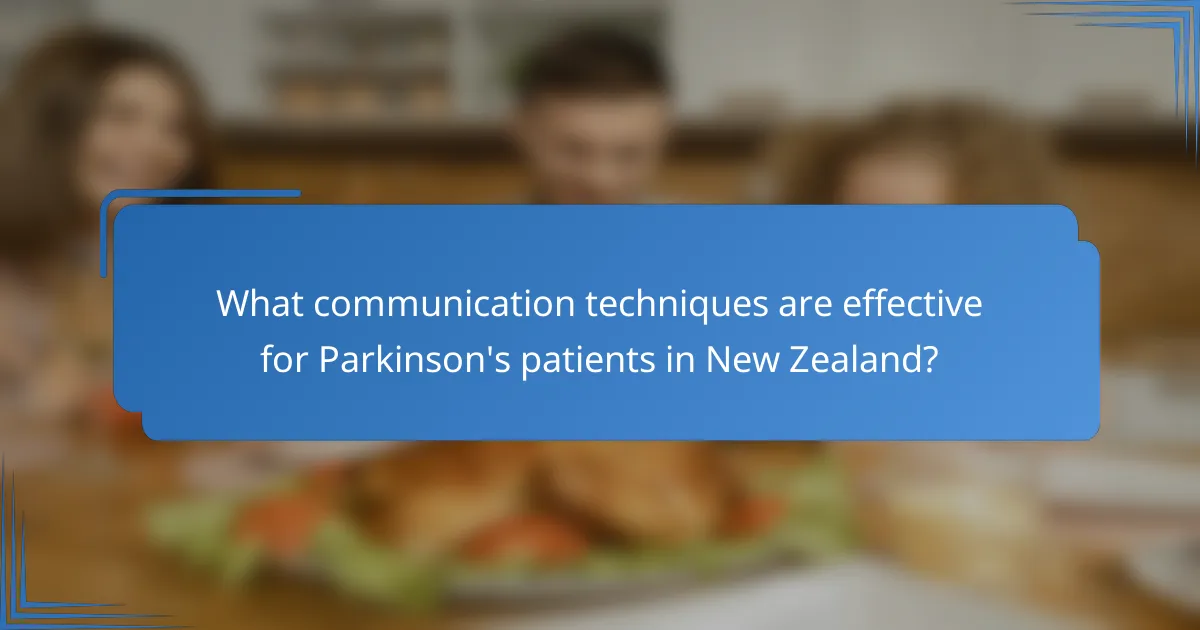
What communication techniques are effective for Parkinson’s patients in New Zealand?
Effective communication techniques for Parkinson’s patients in New Zealand include articulation exercises, breathing techniques, speech amplification tools, and non-verbal communication strategies. These methods help improve clarity and confidence in speech, which can be significantly affected by the condition.
Articulation exercises
Articulation exercises focus on improving the clarity of speech by training the muscles involved in speaking. Simple practices such as repeating sounds, words, or phrases can enhance muscle control and coordination. For example, patients can practice saying “pa-ta-ka” to strengthen their articulatory precision.
Regular practice is essential; aim for short sessions several times a week. Working with a speech therapist can provide personalized exercises tailored to individual needs, ensuring maximum benefit.
Breathing techniques
Breathing techniques are crucial for managing the breath support needed for effective speech. Deep diaphragmatic breathing helps patients maintain a steady airflow while speaking, which can enhance voice volume and clarity. A common exercise involves inhaling deeply through the nose and exhaling slowly through pursed lips.
Incorporating these techniques into daily routines can be beneficial. Patients may find it helpful to practice breathing exercises before speaking engagements or social interactions to boost confidence and control.
Speech amplification tools
Speech amplification tools can assist those with reduced vocal volume, a common issue for Parkinson’s patients. Devices such as handheld amplifiers or wearable microphones can significantly enhance speech audibility in various settings. These tools are particularly useful in group settings or noisy environments.
When considering amplification tools, it’s important to test different options to find the most comfortable and effective solution. Consulting with a speech therapist can help identify the best devices tailored to individual communication needs.
Non-verbal communication strategies
Non-verbal communication strategies are essential for enhancing understanding when verbal communication is challenging. Patients can use gestures, facial expressions, and body language to convey messages effectively. For instance, nodding or using hand signals can reinforce spoken words.
Encouraging family and friends to pay attention to these non-verbal cues can improve overall communication. Practicing these strategies in everyday interactions can help patients feel more confident and engaged in conversations.
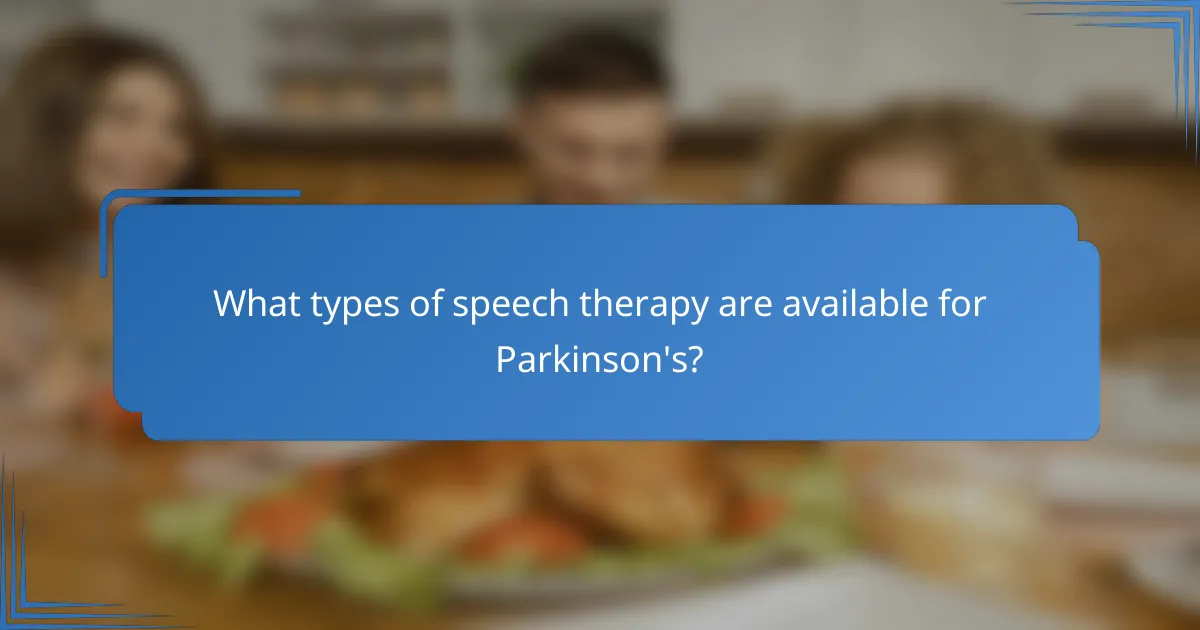
What types of speech therapy are available for Parkinson’s?
Speech therapy for Parkinson’s includes various approaches tailored to improve communication skills and address speech-related challenges. The main types involve individual therapy sessions, group therapy programs, and teletherapy options, each offering unique benefits and methods of delivery.
Individual therapy sessions
Individual therapy sessions provide personalized attention, allowing therapists to focus on specific speech issues faced by the patient. These sessions typically involve exercises to improve voice volume, clarity, and articulation, often using techniques like the Lee Silverman Voice Treatment (LSVT). Patients can expect to engage in targeted practice that addresses their unique communication needs.
During these sessions, therapists may use tools such as speech apps or audio recordings to track progress and provide immediate feedback. Patients should aim for regular sessions, often once or twice a week, to see significant improvement over time.
Group therapy programs
Group therapy programs offer a supportive environment where individuals with Parkinson’s can practice communication skills together. These sessions encourage social interaction, which can enhance confidence and reduce feelings of isolation. Participants often engage in discussions, role-playing, and group exercises designed to improve speech and listening skills.
Group settings can also provide valuable peer support, as members share experiences and strategies for coping with speech challenges. Typically, these programs meet weekly or bi-weekly, making them a flexible option for many patients.
Teletherapy options
Teletherapy options have become increasingly popular, especially for those who may have difficulty traveling to appointments. This format allows patients to receive speech therapy from the comfort of their homes via video conferencing platforms. Teletherapy can be just as effective as in-person sessions, provided that patients have a stable internet connection and the necessary technology.
Patients should ensure they have a quiet space for their sessions and consider scheduling regular appointments to maintain consistency. Teletherapy can also be an excellent option for follow-up sessions after completing initial therapy programs, helping to reinforce skills learned.
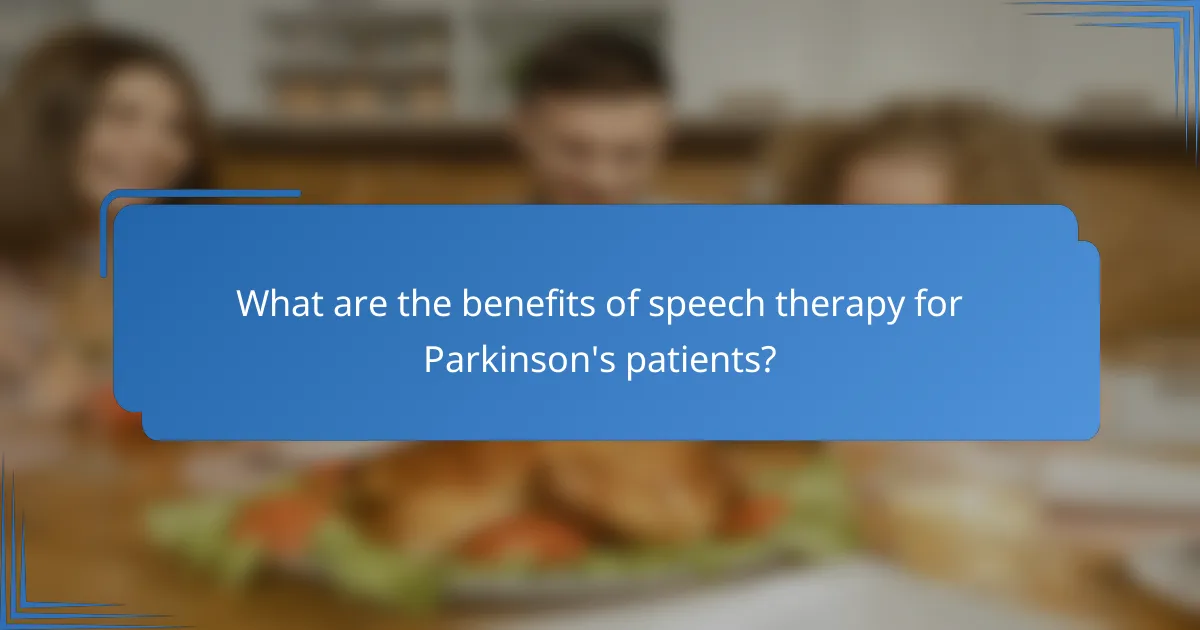
What are the benefits of speech therapy for Parkinson’s patients?
Speech therapy offers significant benefits for Parkinson’s patients by enhancing their communication abilities and overall quality of life. Through targeted techniques, individuals can improve their speech clarity, vocal strength, and social engagement.
Improved communication skills
Speech therapy focuses on techniques that help Parkinson’s patients articulate words more clearly and effectively. Therapists often use exercises that strengthen the vocal cords and improve breath control, which are crucial for clear speech. Regular practice can lead to noticeable improvements in the ability to convey thoughts and feelings.
Techniques such as the Lee Silverman Voice Treatment (LSVT) are specifically designed for individuals with Parkinson’s. This method emphasizes loud speech, which can help patients project their voice and enhance their communication with others.
Enhanced quality of life
By improving communication skills, speech therapy significantly enhances the overall quality of life for Parkinson’s patients. Effective communication reduces frustration and helps maintain social connections, which are vital for emotional well-being. Patients often report feeling more engaged in conversations and activities.
Additionally, therapy can address swallowing difficulties, a common issue for those with Parkinson’s. By improving swallowing techniques, patients can enjoy meals more comfortably, further contributing to a better quality of life.
Increased confidence in social interactions
As communication skills improve, many Parkinson’s patients experience a boost in confidence during social interactions. Feeling understood and able to express oneself clearly can alleviate anxiety in social settings. This newfound confidence encourages patients to participate more actively in conversations and social gatherings.
Therapists often provide strategies to manage situations where communication may be challenging, such as using gestures or writing. These techniques empower patients to engage with others, fostering a sense of community and support.
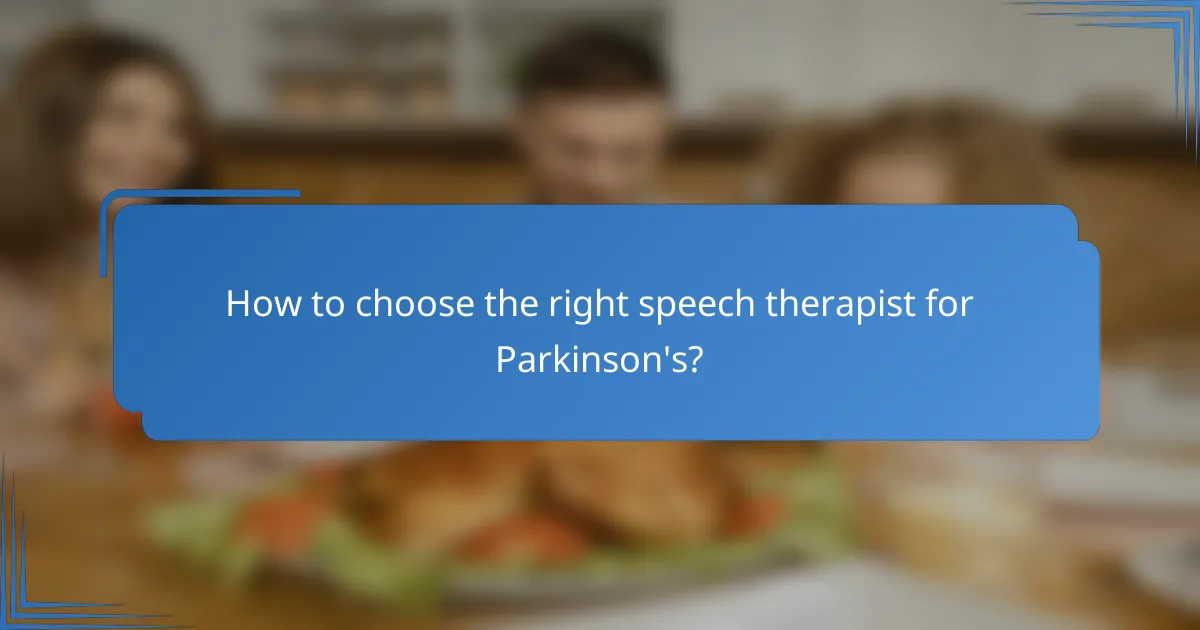
How to choose the right speech therapist for Parkinson’s?
Choosing the right speech therapist for Parkinson’s involves considering their qualifications, experience, and specialization in neurological disorders. It’s essential to find a professional who understands the unique communication challenges faced by individuals with Parkinson’s.
Qualifications and experience
Look for a speech therapist with a master’s degree in speech-language pathology and a valid license to practice in your area. Experience working with Parkinson’s patients is crucial, as they will be familiar with the specific speech and language difficulties associated with the condition.
Consider therapists who have additional certifications, such as the Certificate of Clinical Competence in Speech-Language Pathology (CCC-SLP). This credential indicates a higher level of expertise and commitment to ongoing education in the field.
Specialization in neurological disorders
A therapist specializing in neurological disorders will have a deeper understanding of how conditions like Parkinson’s affect communication. They should be knowledgeable about various therapy techniques tailored to these challenges, such as Lee Silverman Voice Treatment (LSVT) or other evidence-based approaches.
Inquire whether the therapist has experience with interdisciplinary teams, as collaboration with neurologists and occupational therapists can enhance treatment outcomes. This holistic approach ensures that all aspects of the patient’s health are considered.
Patient reviews and testimonials
Reading patient reviews and testimonials can provide insight into a therapist’s effectiveness and approach. Look for feedback on their communication style, empathy, and ability to create a supportive environment.
Consider reaching out to local Parkinson’s support groups for recommendations. Personal experiences from others in similar situations can guide you in making an informed decision about the right speech therapist for your needs.
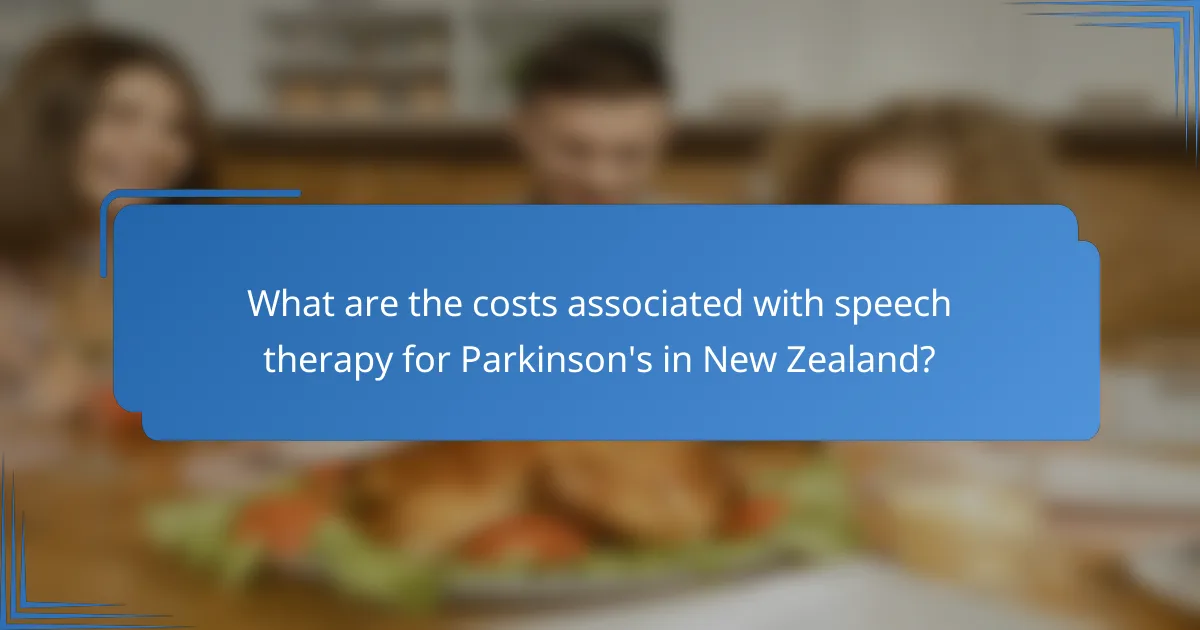
What are the costs associated with speech therapy for Parkinson’s in New Zealand?
The costs of speech therapy for Parkinson’s in New Zealand can vary significantly based on factors such as the therapist’s experience, location, and the type of therapy required. Generally, individuals can expect to pay anywhere from NZD 100 to NZD 200 per session.
Session pricing
Session pricing for speech therapy in New Zealand typically ranges from NZD 100 to NZD 200. Factors influencing this cost include the therapist’s qualifications, the complexity of the therapy needed, and the length of each session, which usually lasts about 45 minutes to an hour.
Some therapists may offer sliding scale fees based on income, so it’s worth inquiring about this option if cost is a concern.
Insurance coverage options
Many health insurance plans in New Zealand may cover speech therapy for Parkinson’s, but coverage can vary widely. It’s essential to check with your insurance provider to understand what services are included and whether a referral from a general practitioner is necessary.
Some plans may require a co-payment or have limits on the number of sessions covered per year, so reviewing your policy details is crucial.
Payment plans and discounts
Some speech therapists offer payment plans to help manage costs, allowing patients to spread payments over several months. This can make therapy more accessible for those on a tight budget.
Additionally, inquire about any available discounts for upfront payments or package deals that include multiple sessions, as these can reduce the overall cost significantly.

What are the latest advancements in speech therapy for Parkinson’s?
Recent advancements in speech therapy for Parkinson’s focus on innovative techniques and technologies that enhance communication skills. These developments include personalized therapy approaches, the use of digital tools, and evidence-based practices that address the unique challenges faced by individuals with Parkinson’s.
Communication techniques
Effective communication techniques for individuals with Parkinson’s often involve strategies that improve clarity and volume. Techniques such as the Lee Silverman Voice Treatment (LSVT) emphasize vocal exercises that help patients project their voice and articulate words more clearly.
Additionally, using visual cues and gestures can significantly enhance understanding during conversations. Practicing slow speech and pausing frequently allows for better processing of information, both for the speaker and the listener.
Therapy types
Several types of speech therapy are available for those with Parkinson’s, including individual therapy sessions and group therapy settings. Individual therapy often focuses on tailored exercises that target specific speech deficits, while group therapy provides social interaction and practice in a supportive environment.
Teletherapy has also gained popularity, allowing patients to access therapy remotely. This can be particularly beneficial for those living in rural areas or with mobility challenges, ensuring they receive consistent support without the need for travel.
Benefits
The benefits of speech therapy for Parkinson’s patients are substantial, leading to improved communication skills and enhanced quality of life. Patients often experience increased confidence in their speaking abilities, which can positively impact social interactions and relationships.
Moreover, regular speech therapy can help mitigate the progression of speech-related symptoms, allowing individuals to maintain their ability to communicate effectively for longer periods. Engaging in therapy can also provide emotional support, reducing feelings of isolation associated with the disease.
